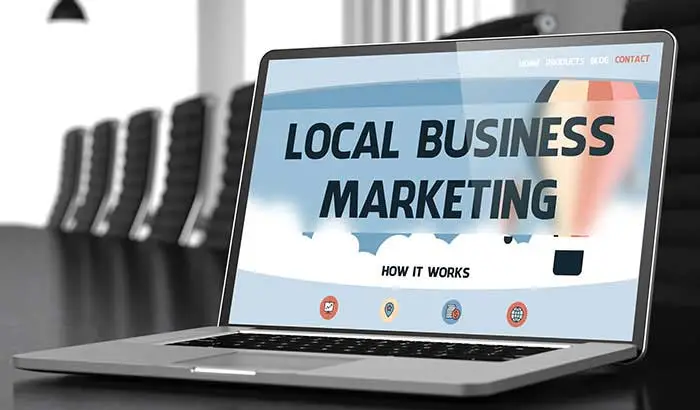As a small business owner, you may wonder why you should focus on local business marketing. After all, the internet has made it easier than ever to reach customers all over the world.
However, while having a global presence may be beneficial in some cases, it is crucial to recognize the importance of local business marketing. In this blog post, we will explore what local business marketing is, why it is important, why you should focus on your local audience, and how it differs from global and national marketing.
What is Local Business Marketing?
Local business marketing refers to promoting a business to potential customers in a specific geographical area. This could include a single state, city, town, or even a neighborhood. Local business marketing aims to establish a strong presence in the local community, build relationships with customers, and differentiate your business from competitors.
Why is Local Business Marketing Important?
1 – Builds Trust and Loyalty
When you focus on your local audience, you can build stronger customer relationships. By engaging with customers on a personal level, you can establish trust and loyalty, which are essential for long-term success. Customers are more likely to remain loyal to a business that they feel understands their needs and values their business.
2 – Differentiates Your Business from Competitors
By establishing a strong local presence, you can differentiate your business from competitors who may not be as visible or active in the local community. This could include sponsoring local events, supporting local charities, or offering exclusive deals to local customers. By showing that you are invested in the local community, you can create a competitive advantage that is difficult for others to replicate.
3 – Increases Visibility
When you focus on local business marketing, you increase your visibility to potential customers in your area. This could include appearing in local search results, being featured in local publications, or being mentioned in local social media accounts. By increasing your visibility, you can attract new customers who may not have otherwise discovered your business.
4 – Boosts Local Economy
When you focus on local business marketing, you are promoting your business and contributing to the local economy. By supporting other local businesses, you help to create a thriving ecosystem that benefits everyone in the community. This can positively impact your business, as customers are more likely to support businesses they feel are invested in the community.

Why Focus on Your Local Audience?
1 – More Personalized Marketing
When you focus on your local audience, you can create more personalized marketing campaigns. This could include targeting specific neighborhoods, demographics, or interests. You can create a more personal connection with potential customers by tailoring your marketing efforts to the local audience.
2 – More Cost-Effective Marketing
Focusing on your local audience can also be more cost-effective than targeting a global audience. This is because you can focus your marketing efforts on a smaller geographical area, saving money on advertising and promotional costs. Additionally, local marketing campaigns tend to have a higher ROI than global campaigns because they are more targeted.
3 – Easier to Build Relationships
When you focus on your local audience, you have the opportunity to build stronger relationships with customers. By building strong relationships, you can establish trust and loyalty, which are essential for long-term success.
4 – Better Understanding of Local Marketing
Focusing on your local audience also allows you to gain a better understanding of the local market. This could include understanding local trends, preferences, and purchasing behaviors. By understanding the local market, you can tailor your products, services, and marketing efforts to better meet your customers’ needs.
How to Implement Local Business Marketing
- Define Your Target Audience
The first step in implementing local business marketing is to define your target audience. This could include specific demographics, interests, or neighborhoods. Understanding your target audience can create more personalized marketing campaigns tailored to their needs and preferences.
- Establish a Strong Online Presence
In today’s digital age, it is essential to have a solid online presence, even for local businesses. This could include creating a website, optimizing your website for local search, and creating social media accounts. In addition, establishing a strong online presence can increase your visibility to potential customers in your area.
- Partner with Other Local Businesses
Partnering with other local businesses is a great way to support the local economy and create a strong network within the community. This could include cross-promotion, joint events, or offering exclusive deals to each other’s customers. By partnering with other local businesses, you can expand your reach and attract new customers.
- Offer Exclusive Deals to Local Customers
Offering exclusive deals to local customers is a great way to incentivize them to choose your business over competitors. This could include discounts, coupons, or loyalty programs. You can create a competitive advantage and build customer loyalty by offering exclusive deals.
- Leverage Local SEO
Local SEO is the process of optimizing your website and online presence for local search. This could include optimizing your website for local keywords, creating local business listings, and obtaining online reviews. By leveraging local SEO, you can increase your visibility in local search results and attract more customers.
- Attend Local Events
By attending local events, you can engage with potential customers on a personal level and build strong relationships.
- Community events: Participating in these events can help a business increase its visibility and engage with potential customers.
- Trade shows and expos: These events bring together businesses and potential customers in a specific industry or niche. They provide an opportunity for a business to showcase its products or services to a targeted audience and network with other professionals in the field.
- Sponsorship of local teams or organizations: A business can sponsor a local sports team, school, or community organization, which can help increase brand awareness and loyalty among local customers.
- Networking events: These are events where local business owners and professionals gather to meet and network with each other. Attending these events can help a business build relationships with other businesses in the area, leading to new opportunities and collaborations.
- Pop-up shops are temporary retail spaces that a business can set up in a local area to sell its products or services. They provide a unique and engaging way for a business to interact with potential customers and test out new markets.
Now that you’ve got a deep dive into the world of local business marketing, let’s take a closer look at how local marketing differs from global or national marketing. While both aim to promote a product or service to a specific audience, there are significant differences in their approaches, scope, and focus.

First, a quick recap on local marketing:
Local Marketing
As the name suggests, local business marketing is a strategy focused on promoting a product or service to a specific geographical area, usually a city, town, or region. The primary goal of local marketing is to attract customers from the immediate vicinity of the business location and create a strong brand presence in the local community. Local marketing often involves creating hyper-targeted campaigns to reach a specific group, such as people of a certain age, interest, or socio-economic status.
Local marketing often uses traditional marketing channels such as flyers, billboards, radio, and newspaper ads. However, it is also common for businesses to use digital marketing tactics such as social media marketing, search engine optimization (SEO), and local directories. The key benefit of local marketing is that it allows businesses to establish a personal connection with the target audience and build a reputation as a local business that understands and meets the unique needs of the community.
Now, a quick look at global and nationwide marketing:
Global or Nationwide Marketing
Global or nationwide marketing, on the other hand, is a marketing strategy that aims to promote a product or service to a broader audience, usually on a national or international level. The primary goal of global marketing is to create brand awareness and reach as many potential customers as possible, regardless of their location.
The key benefit of global marketing is that it allows businesses to reach a larger audience and create a unified brand image across different regions and countries. As a result, international marketing campaigns are often characterized by their scale, high budget, and broad scope.
Finally, let’s check out some of the differences between these marketing strategies:
Differences Between Local and Global Marketing
1 – Target Audience
The primary difference between local marketing and global marketing is the target audience. Local marketing focuses on promoting a product or service to a specific geographical area, while global marketing aims to reach a wider audience, often on a national or international level. Local marketing campaigns are typically aimed at a small group of people who live within a specific area. In contrast, global marketing campaigns target a broader range of people with different interests and backgrounds worldwide.
2 – Marketing Channels
Another key difference between local and global marketing is the marketing channels used. Local marketing campaigns often use traditional advertising methods such as flyers, billboards, and local newspapers, while global marketing campaigns typically rely more on digital channels such as social media, email marketing, and PPC advertising. This is because global marketing campaigns often require a larger budget and resources to reach a wider audience.
3 – Scope
The scope of local marketing is usually limited to a specific geographic area, while global marketing campaigns aim to reach a broader audience on a national or international level. Local marketing campaigns may be more focused on creating a personal connection with the target audience and building a reputation as a local business that understands and meets the unique needs of the community. In contrast, global marketing campaigns aim to create brand awareness and reach as many potential customers as possible, regardless of location.
4 – Budget
The budget for local marketing campaigns is typically smaller than that of global marketing campaigns. This is because local marketing campaigns are aimed at a smaller audience and often use less expensive methods than digital marketing channels. On the other hand, global marketing campaigns require a larger budget because they aim to reach a wider audience, often across different regions and countries.
5 – Message and Tone
The message and tone used in local marketing campaigns often differ from those used in global marketing campaigns. For example, local marketing campaigns often focus on creating a personal connection with the target audience and using language and tone that resonates with the local community. In contrast, global marketing campaigns use a universal tone and language that can be understood by a broader audience, regardless of their location or culture.
6 – Competition
Local marketing campaigns often face less competition than global marketing campaigns. This is because local businesses typically operate in a specific area and may have fewer competitors to compete against. In contrast, global marketing campaigns may face competition from a broader range of companies that operate nationally or internationally.
7 – ROI
ROI stands for “Return on Investment,” which measures an investment’s profitability. When it comes to local marketing, ROI measures the return a business gets on the money it spends on local marketing efforts.
Return on Investment (ROI) – Locally
Local marketing refers to the process of promoting a business or product to a specific geographic area or community. ROI in local marketing can be measured by comparing the amount spent on local marketing efforts, such as advertisements, events, or promotions, to the revenue generated.
For example, if a business spends $1,000 on a local advertising campaign and generates $10,000 in revenue. As a result, the ROI would be 10:1, or 1000%. This means that for every dollar spent on the campaign, the business received $10 in revenue.
Return on Investment (ROI) – Globally
Global marketing refers to the process of promoting a product or service to customers around the world. ROI in global marketing can be measured by comparing the amount of money spent on marketing efforts, such as advertising, public relations, or events, to the revenue generated from those efforts on a global scale.
For example, if a business spends $100,000 on a global marketing campaign and generates $1 million in revenue. As a result, the ROI would be 10:1, or 1000%. This means that for every dollar spent on the campaign, the business received $10 in revenue on a global scale.
Measuring ROI in local and global marketing is important for businesses because it helps them determine the effectiveness of their marketing efforts and make informed decisions about how to allocate their marketing budget in the future. It also helps businesses identify which regions or markets are the most profitable and where they should focus their marketing efforts in the future.
Local marketing and global or nationwide marketing are two primary marketing strategies that businesses can use to promote their products or services. While both have benefits, local marketing allows businesses to establish a personal connection with their target audience, create brand awareness in their local community, and differentiate themselves from their competitors.
Global or nationwide marketing has several advantages over local marketing, including larger audience size, greater brand recognition, access to a larger pool of talent, and the potential for economies of scale. However, local marketing can also be effective, particularly for small businesses that rely on a local customer base.
Revity Marketing Agency Can Help With All Your Digital Marketing Needs!

Do you want to avoid feeling lost in the digital marketing maze? Do you want to get the most out of your marketing efforts but need help knowing where to start? Well, look no further! Revity is here to make your life easier and help you achieve your marketing goals.
the
At Revity, we believe that working with a digital marketing expert should be easy, stress-free, and, most importantly, effective. That’s why we’ve created a team of digital marketing guides who will work with you to design a customized path forward.
Our guides are experts in their field and will help you navigate the ever-changing digital landscape to reach your destination – success.
At Revity, we don’t believe in one-size-fits-all solutions. Instead, we work with you to understand your unique needs and goals and create a custom plan tailored to your business. So we’ve got you covered whether you need help with search engine optimization, pay-per-click advertising, social media marketing, or email marketing.
So, if you’re ready to take your marketing to the next level, join forces with Revity. We’re excited to help you reach new heights and achieve your marketing dreams!
































